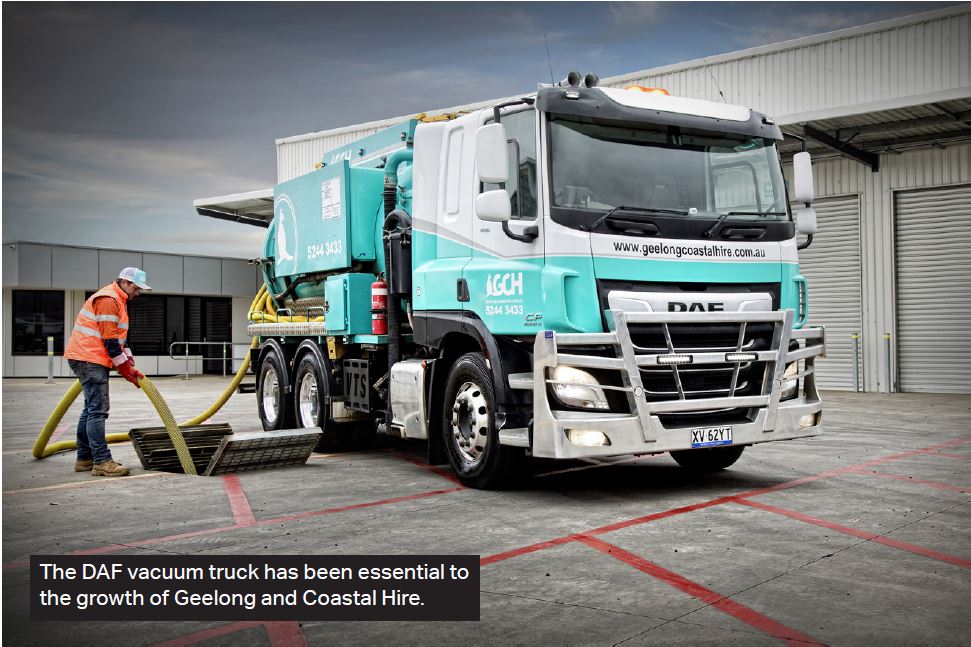
Waste removal on the up
GCH is a family business that has grown in size, becoming a serious player throughout the region.
This growth can be, in part, connected to its partnership with DAF Trucks and PACCAR.
GCH is part of Geelong and Coastal Hire. The hire arm of the business has existed since the 1980s and was growing rapidly. In the late 2000s, the company started its Commercial Waste operations as part of its movement into site amenities.
Ben Friel is the General Manager at Geelong and Coastal Hire. He has seen the family business change markedly.
“We have seen significant growth in the waste removal industry,” Ben says.
“The waste side of the business now represents about one dollar in three for us. Five years ago, it would have been a tiny fraction of that.
“We’ve seen considerable growth in that side of the business in the past decade. That growth saw us purchase our first vacuum truck.
We have since bought three of these trucks, with a fourth coming soon. It reflects the organic growth we have experienced in the region.
“There’s enormous scope for the industry going forward.”
DAF TRUCKS
This is where DAF Trucks comes in. Through one of its dealers in PACCAR, DAF Trucks has been helping GCH expand its truck network. Currently, GCH has a DAF CF450 and is due to receive an LF290 early in 2024. The DAF CF range redefines versatility. It includes two, three and four-axle configurations. The range is designed for specialist applications such as concrete pumpers, waste, tippers and tankers. While the exterior dimensions of DAF CF cabs give it excellent manoeuvrability in tight situations, its interior provides a driver environment like no other.
Ben is among the many users who understand the difference. He says the DAF CF is the ultimate all-rounder and makes an already superior truck better, setting the standard and delivering pure excellence.
“We’ve been really happy with DAF Trucks,” says Ben. “I was chatting with the dealer the other day, and we’re looking to get a third truck in soon.”
The DAF CF driveline delivers industry-leading fuel economy. The DAF CF features an efficient MX-11 or MX-13 PACCAR engine with enhanced electronics, an optimised TraXon automated gearbox or Allison automatic gearbox and PACCAR high-efficiency rear axles. The DAF CF delivers higher torque at lower revs, resulting in increased fuel efficiency over a wide range of applications and fuel savings that help reduce total cost of ownership.
The DAF LF compact design adds to optimal manoeuvrability. Its wheel angles give it the smallest turning circle in its class. The galvanised steel bumper means low susceptibility to damage. The covers of the new headlights, which can be equipped with optional Day Time Running Lights, are made of high-impact resistant Lexan.
“DAF and PACCAR have been great to work with,” Ben says. “We required something that was reliable on the road within three months. In the middle of COVID, that was unheard of. They truly went above and beyond in our dealings. Since then, their after-sales service has been on point. We have never had an issue with them.”
FUTURE IS GREEN
Ben believes that the future of the waste industry will be green fleets. He has seen the biggest players in the sector spending considerable sums to invest in improving their environmental footprint.
“From what I’m seeing, there’s a desire to minimise the environmental impact,” he says. “That looks like it will take the form of hydrogen or electric vehicles.
I’ve seen several larger multinational companies spending time and money working out how to introduce those vehicles into their fleets.”
He also believes that customer interest will drive the shift into a greener industry. It’s entirely possible that local governments could impose European-style emissions standards, starting at Euro 6. These regulations examine various emissions, including nitrogen oxide, carbon monoxide, hydrocarbons, and particular matter. Each of these must be below the stated levels under Euro 6
“They would be enforcing Euro 6 as a minimum standard, which would force some of the older vehicles off the road,” Ben says.
“That might push the big multinational companies to invest further into hydrogen or electric trucks.”
The other side of the waste management industry will be the growth of recycling facilities.
“I’ve also seen considerable money from the private sector being used to develop recycling facilities,” Ben says.
“This is a big shift from everything winding up in landfills. The goal is to recapture everything and repurpose as much as possible, to minimise the environmental impact.”
He believes that industry could see more automation, whether in the recycling of materials or the types of vehicles.
“I’d assume that there’s going to be a lot of private investment in recycling facilities and technology to help minimise the impact on the environment.”
The article was reproduced courtesy of Waste Management Review (December 2023).
Share this Post
